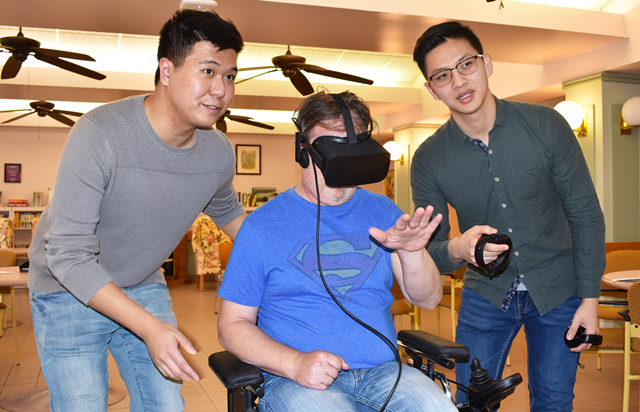
By Nikki Jhutti
Imagine starting your day off at a café in Rome, spending your afternoon snorkeling along the Great Barrier Reef and taking a quick trip to Paris to see the Eiffel Tower at night, all in the same day.
Sounds impossible right?
Not for Providence Manor residents.
The long-term care home’s recreation department recently invested in virtual reality, to give residents the chance to see the world and all it has to offer.
“We’re the first long-term care home in Kingston to offer virtual reality,” explained Danielle Preston, program coordinator.
“Residents can experience something new and different that takes them outside the four walls of the home. We offer as much as we can in terms of recreation, but for someone who may be in a wheelchair who used to travel, this allows them to do that again, which improves their quality of life. Families are excited about it and staff are excited about it.”
With 243-beds Providence Manor is Kingston’s largest long-term care home.
It provides care to residents who have stable medical conditions, but who also require 24-hour nursing care.
Preston and her small but mighty recreation department run a minimum of seven activities a day, including evening programming.
Every month there’s hundreds of fun activities and games for residents to take part in, but finding something everyone likes can be a challenge.
“No two people are going to like all the same things. There’s no cookie cutter here, so we have to offer a variety of programs and a variety of experiences throughout the day. We’re consistently reevaluating what we offer and looking at levels of engagement, because ultimately it’s the resident’s decision if they want to participate.”
Providence Manor also has a younger demographic.
There are quite a few people under the age of 65, who have had strokes or live with multiple sclerosis, who now call Providence Manor home.
“Your stereotypical long-term care home programs aren’t what those residents want,” explained Preston.
“They want the Superbowl Sunday party and pub nights, so we have to keep adapting and altering our programming to make sure there’s something for everyone.”
That’s why Preston wanted to bring in virtual reality or VR for short.
The interactive computer generated system uses a headset and sensors, and creates a highly immersive, 360 degree artificial environment for users, who download games and experiences.
With endless possibilities, there’s something for everyone; from hitting the fairways at some of the top PGA Tour Courses, to hiking up Machu Picchu in Peru.
And those adventures are just a click away.
“You can literally download any type of experience or game. You can meditate in a field, or hop on rollercoasters at different amusement parks. You can go on Google Earth and look up your childhood home, or the school your kids went to, or a neighbourhood park,” added Preston.
She admits she isn’t the most tech savvy person, that’s why she enlisted the help of The Interact Project to set things up.
The nonprofit has volunteers who bring VR systems to long-term care homes and rehabilitation centres for a few hours a day, for free.
Founders George Cao and David Zheng created The Interact Project while volunteering at a long-term care home in Ottawa.
“One of the most popular activities was bingo on Saturday afternoons. We would talk to residents after and they told us they weren’t really interested in bingo, they were just passing the time,” said Cao.
Both had recently tried VR and thought it could be a great fit in long-term care homes.
“When we first tried it, we were surprised at how realistic it was. We thought it was too good not to share,” said Zheng.
“Sometimes when you’re in a long-term care home you don’t really get the opportunity to go outside as much, so this is a nice escape.”
The pair added most homes end up purchasing their own VR systems once they see the benefits and how much residents enjoy it, which is what Preston did with Providence Manor.
“It’s been shown to decrease depression, and increase quality of life and social engagement. Residents feel happy and they get to control where they want to go, or what they want to do, and I think giving them the control, can be life changing,” explained Preston.
“We want residents to have fun with it, to laugh and play, to try something new that takes them out of their comfort zone and experience something that brings them pure joy.”
And with the world at their fingertips, there’s no limit to what sorts of adventures Providence Manor residents will have.
Nikki Jhutti is a Communications Officer at Providence Care in Ottawa.

